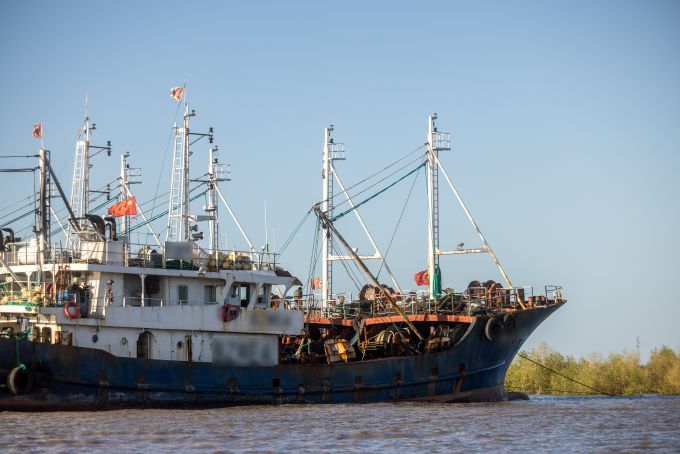The Environmental Justice Foundation (EJF) has published a new report [link] showing that the Chinese fishing fleet is engaging in systemic illegal fishing and human rights abuses in countries bordering the Southwest Indian Ocean (SWIO). This contradicts China’s claims of supporting sustainable development and thriving blue economies in the region. This issue is crucial for EU members, as seafood linked to these vessels may enter key international markets, including Europe.
China’s distant water fleet (DWF) is the largest in the world and has a growing reputation for perpetrating egregious human rights abuses and illegal fishing. Through the Belt and Road Initiative, China has invested heavily in the countries bordering the SWIO, including building ports and fisheries infrastructure. However, the terms of these investments are often opaque, and civil society groups and local communities have raised concerns regarding their impacts on coastal communities. This new investigation shows that Chinese investment, far from benefiting these communities directly and indirectly, impacts the livelihoods of artisanal fishers through the illegal fishing perpetrated by China’s DWF.
“It’s well past time for closer attention to be paid to China’s DWF and fisheries investments in the region by the Indian Ocean Tuna Commission, coastal states, market states, port states, flag states and, most of all, by the Government of the People’s Republic of China itself. At a minimum, this must include improving fisheries transparency to enable everyone to better understand who is fishing, how, where and for what. While the Chinese DWF is not the only culprit for illegal fishing in the SWIO, the uniquely shocking abuses it perpetrates across the region demand significant change now,” Steve Trent, CEO and Founder of EJF, said.
EJF has conducted extensive analysis of China’s distant water fishing (DWF) over the years, revealing clear cases of illegality and abuse. The organisation has monitored the Chinese fleet since 2020 and has conducted multiple investigations into its illegal and unethical activities, including 318 interviews with former crew members who worked on at least one Chinese vessel, 96 of which were conducted in the last six months. However, the extent of criminal abuses in the Southwest Indian Ocean (SWIO) starkly contrasts China’s supposed interests in the region. This new investigation exposes four deaths that occurred on Chinese vessels between 2017 and 2023, including one suspected suicide of a crew member who allegedly threw himself overboard.
“We have revealed that China’s DWF is responsible for appalling abuses and illegal fishing in the SWIO. What our investigations show is that these abuses are not confined to one vessel or fleet; one geography or jurisdiction; but almost all Chinese fishing vessels and fleets in all geographies and jurisdictions we have examined. While the Chinese government portrays its investment in the countries bordering the SWIO as a win-win, the clear reality is that it is doing direct harm. This applies equally to coastal communities whose livelihoods are threatened by the activities of these commercial vessels, to the people suffering shocking human rights abuses on the same vessels, and to the SWIO countries saddled with corruption and debt from China’s investments,” Trent added.
The EJF interviewed fishers who had worked on China’s tuna fleet in the SWIO and found that all of them had experienced or witnessed some form of human rights abuses and/or illegal fishing. It also used a wide range of secondary data sources. It is the first to examine China’s DWF in the region. Between 2017 and 2023, Chinese vessels were linked to 86 unique cases of illegal fishing or human rights abuses in the SWIO. Of the 95 tuna longliners currently believed to be authorised to fish for tuna in the SWIO, almost half are linked to cases of illegal fishing and/or human rights abuses.
Of the 44 anglers interviewed, 80% reported shark finning, 100% reported abusive working and living conditions, 96% reported excessive overtime, and 55% reported physical violence. EJF also interviewed 16 fishers who worked on Chinese trawlers in Mozambique, who similarly reported widespread illegalities. 81% of them reported physical abuse, and half of them reported the deliberate capture and/or injury of vulnerable marine megafauna.
Seafood linked to these vessels potentially enters vital international markets, including Europe, the US, Japan, and South Korea. At the time of writing, around 73% of the vessels suspected of human rights abuses and illegal fishing appear on the list of authorised exporters to the EU.
“Our extensive research raises a simple question: are these abuses at the direction of the government in Beijing, or is it failing in its responsibilities to manage its fleet? The weight of evidence is so undeniable that one or the other must be true,” noted Steve Trent.

